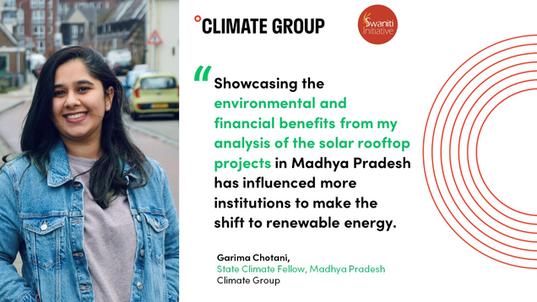Interview with Garima Chotani, State Climate Fellow, Madhya Pradesh, India
Earlier this year, we launched the State Climate Fellows initiative in India to support subnational climate action. Garima's role, as a Fellow in Madhya Pradesh, is to work on NITI Aayog's SuBaH project on rooftop solar and its implementation across all states. We spoke to her to learn about her experience as a Fellow and the impact of her project.
Tell us about your work as a State Climate Fellow in Madhya Pradesh. What is the most exciting task you are involved with?
I am working with the State Renewable Energy Department on de-risking solar projects like the Rewa solar project (the first project in India to produce solar energy at rates lower than that of coal-based power) and the Solar Rooftop Project in Madhya Pradesh, India. These projects were launched three years ago and I am responsible for showcasing their environmental and financial benefits. This will provide replicable metrics and help other states join the decarbonisation efforts. Additionally, I am working on the SuBAH initiative by NITI Aayog under the public-private partnership (PPP) model, wherein solar projects will be set up on rooftops of public health institutions without any public investment.
I will be interacting and coordinating with stakeholders across the state, NITI Aayog and other solar developer companies for the implementation of these projects.
Why did you choose to take this opportunity in a state which is not your native state? What are your biggest challenges?
I was fortunate to have worked on several consulting projects in several states in India. It gave me valuable experience on a variety of issues and solutions in the field of climate action. To have more such experiences, I chose to work outside of my native state. I was inspired by the execution of solar projects in Madhya Pradesh and the benchmark of producing electricity at rates lower than coal power. This was a great opportunity for me to build my expertise in the renewable energy sector.
The biggest challenge for me was to understand and communicate the technical language of solar energy projects. However, I overcame this with the cooperation and assistance of my supervisor, Manu Srivastava (IAS). He has always been kind and helpful in explaining the project guidelines and my tasks.
As a young professional, how has your experience been working on climate action at the subnational level with the government?
Subnational governments are well placed to identify the needs of their communities and in furthering climate action. In this setting, I learnt about the working of government processes while developing and implementing policies on climate change and clean energy. I got the opportunity to coordinate with government stakeholders from NITI Aayog, state governments, intergovernmental organisations (such as the UNDP and the World Bank) and other private organisations to implement the SuBAH project in all the states. These experiences have helped me develop teamwork and other interpersonal skills.
I have conducted cost analyses and evaluated the environmental benefits of installing solar rooftops for 15 educational and five government institutions. There has been a projected saving of INR 40 Cr (over $5,125,000) and a CO2 emission reduction of 5000 tonnes per year. These two-way benefits have shown that the state has taken climate action responsibilities very seriously. It is a valuable experience for me to have been involved in contributing to state-level climate action.
How do you think your fellowship is contributing towards Madhya Pradesh's subnational climate action goals?
The fellowship is contributing to broadening the scope of climate action in Madhya Pradesh. The state has been implementing energy efficiency measures and renewable power in government and health institutions. However, with the fellowship, there are several third-party organisations working on agricultural value chains, the transport sector and EVs. They have shown interest in collaborating with the state government, thus contributing to multi-sectoral climate action.
My involvement in multiple solar energy projects like Rewa and the solar rooftop project in Madhya Pradesh has revolved around analysing the impact of the implemented projects in the last two years. Showcasing the environmental and financial benefits from my analysis has influenced more institutions and departments to make the shift to renewable energy for their electricity at the state level. This shift brings down the carbon footprint in the state's energy sector.
What do you look forward to as a State Climate Action Fellow working on subnational action on climate in India?
I would like to continue broadening the scope of renewable energy projects in more government, education and health institutions of Madhya Pradesh along with other private institutions. Furthermore, I plan to facilitate scaling the PPP model of solar projects (as implemented in Madhya Pradesh) to other states of India by assisting the state government. With this vision, I would like to research and find more ways to facilitate the implementation of ground-mounted and solar rooftop projects.
Through the fellowship programme, I would like to focus on other states to scale and replicate the existing best practices, such as the SuBAH solar rooftop project. Fellows from a few other states are assisting in initiating this process of interacting with the Renewable Energy and Health Departments to implement the established model.
Lastly, I want to assist in the replication of the solar model project in other sectors like agricultural storage, transport sector-related institutions and irrigation facilities.
